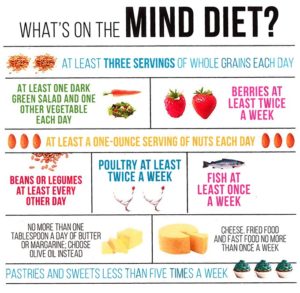Article from Diet and Alzheimer’s Disease by James M. Ellison, MD, MPH
Food has such an important purpose in our lives. It provides us joy, gives us comfort and brings people together. But food can also create or sustain illness and distress.
Much research has been directed at understanding how dietary patterns affect the risk for Alzheimer’s disease and other dementias, and here too, food can play a positive, health-improving role or a destructive and disease-promoting role. The World Health Organization recently concluded that many cases of cognitive decline could be delayed or prevented through adopting a healthier lifestyle. Physical activity, diet, smoking cessation, and attention to chronic medical diseases are all important contributors to healthier cognitive aging. So, what do we know about food and Alzheimer’s disease?
Foods that May Increase the Risk of Alzheimer’s
First, we know that an unhealthy diet can promote cognitive decline along with other health problems. Scientists have looked at what they call the “Western diet,” a pattern rich in convenient, processed foods and rich in animal products. The typical western diet is high in total fat, saturated fat, cholesterol, sodium, processed grains and large amounts of added sugar. This eating pattern has been linked to obesity, diabetes, and heart disease. A high intake of saturated and trans-fats increase the body’s levels of oxidative stress and inflammatory response, harmful processes which contribute to the development of dementia. The take-away message? Cut down on total caloric intake, saturated and trans-fats, and sugar.
Foods that May Decrease the Risk of Alzheimer’s
Next, we know that a healthier diet can protect cognitive functioning while also improving other aspects of health. Most of the research on diet and Alzheimer’s has focused on the Mediterranean diet (MD), an eating pattern that emphasizes healthy fats such as olive oil, fresh fruits and vegetables, legumes, nuts, and less dairy food, red meat, butter or margarine, sweetened beverages, and pastries. Moderate wine consumption is included in some, but not all, European and Middle Eastern populations who have adopted the MD.
The DASH Diet
In the United States, concern about lifestyle and rampant high blood pressure led our National Heart, Lung, and Blood Institute to propose a set of dietary recommendations known as the Dietary Approaches to Stop Hypertension (DASH) Diet. The DASH Diet emphasizes many MD components as well as a reduction in overall consumption of carbohydrates and sodium. It has been shown to reduce blood pressure.
 The MIND Diet
The MIND Diet
More recently, the Mediterranean-DASH Intervention for Neurodegenerative Delay Diet, known popularly as the MIND Diet, has been shown to slow down cognitive decline. The MIND Diet takes elements of MD and DASH and recommends dietary focus on the “good” foods such as whole grains, green leafy and other vegetables, berries, fish, poultry, beans, nuts, and olive oil while minimizing intake of “bad” foods such as red meats, butter, margarine, cheese, fast foods, and sweets. One study found that adherents to the MIND Diet demonstrated more successful cognitive aging and the MIND Diet provided even better protection against Alzheimer’s disease in this study than the DASH or MD diets.
Can Vitamins and Supplements Decrease the Risk of Alzheimer’s?
Not all that we eat falls into the category of food, and many vitamins or supplements have also been studied in relationship to Alzheimer’s disease risk. We certainly need enough of the essential vitamins such as folic acid, B12, E, and D. Excessive E or D, however, accumulate in our fat tissues and are not beneficial. Curcumin, omega 3 fatty acids, and cocoa are among the dietary additives still being researched for a deeper understanding of their risks and benefits. A study recently published in the Journal of the American Medical Association cautioned us that many dietary supplements marketed for the prevention or treatment of cognitive decline are not well supported by credible evidence. It is always best practice to consult your physician regarding adding vitamins or supplements into your daily routine.
Food and Brain Health
Our growing appreciation of the relationship between diet and brain health, and the behaviors we choose to change or continue, will shape the health of our aging population. Along with other lifestyle choices, our food consumption habits can have constructive or destructive effects on brain health. We are armed with the knowledge that can benefit society and delay or prevent many cases of cognitive decline.
Senior Services offers an array of memory support programs including free and confidential memory screenings to obtain a cognitive baseline, our early memory loss program, and educational classes along with support from Seasons Adult Day Health Services. If you or someone you know is experiencing increasing changes with their memory and could benefit from additional services, please contact Amy Sheridan, Family Support and Activity Manager at 989-633-3764.
Please continue to check out the section, Our Mind Matters, next month.

